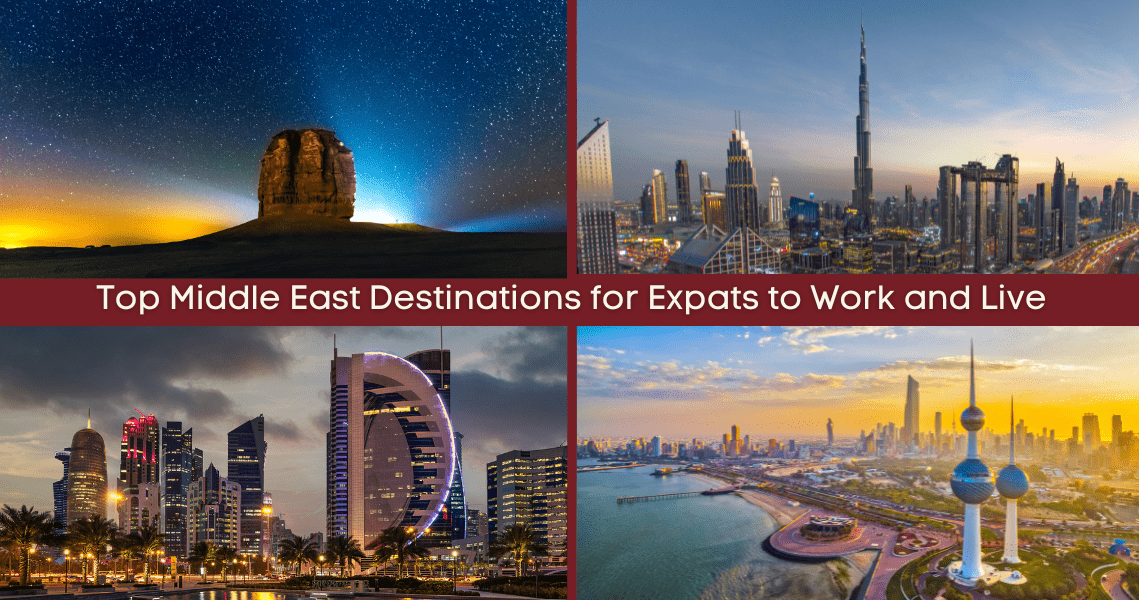- +966 11 22 11 445
- enquiries@pangeamobility.com
- RIYADH | JEDDAH | DUBAI | EASTERN REGION

Exploring the best Middle Eastern countries to work and live in is a fascinating journey through a region rich in cultural diversity, economic opportunity, and natural beauty. Our blog delves into key aspects that make certain Middle Eastern countries highly attractive for expatriates, including economic opportunities, quality of life, and cultural experiences.
United Arab Emirates: A Blend of Tradition and Modernity
The United Arab Emirates (UAE) tops the list as one of the most popular destinations for expatriates. Known for its luxurious lifestyle, tax-free income, and cutting-edge infrastructure, the UAE, particularly Dubai and Abu Dhabi, has shown remarkable economic resilience, forecasting a robust 5.7% GDP growth for 2024. This optimism is underpinned by strategic diversification efforts away from oil, with significant contributions from real estate, tourism, and transportation sectors. The nation’s commitment to sustainable development and innovation is evident in its non-oil GDP growth, projected at 4.7% for 2024. The UAE continues to attract global talent and investment, underscored by a thriving real estate market and a booming tourism sector that reinforces its position as a top destination for expatriates seeking vibrant work and lifestyle opportunities.
Qatar: Booming Economy and Cultural Heritage
Qatar’s rapid economic growth, fueled by its natural gas reserves, has made it an attractive destination for workers from around the world. Doha, the capital, is known for its high standard of living, world-class healthcare, and international schools. With the government’s significant investment in infrastructure and the upcoming FIFA World Cup, Qatar’s job market is booming, presenting numerous opportunities for skilled professionals.
Saudi Arabia: The Heart of the Arab World
Saudi Arabia, the largest economy in the region, is undergoing transformative changes under its Vision 2030 initiative. The kingdom is focused on diversifying its economy beyond oil, with efforts to boost savings rates among individuals and encourage the private sector to issue sukuks. These measures aim to increase the savings rate from 6% to the global average of 10%, reflecting a broader strategy to foster economic resilience and sustainability. Saudi Arabia’s commitment to being a reliable energy supplier and its focus on sectors like chemicals and lower-carbon energy highlight its ambition to be a key player in global economic development, making it an attractive destination for professionals looking to contribute to and benefit from its growth trajectory
Oman: Natural Beauty and Expatriate-Friendly Policies
Oman is known for its breathtaking natural landscapes, from mountains and deserts to beautiful coastlines. The Sultanate offers a more relaxed lifestyle compared to its neighbors, with a strong emphasis on preserving its rich cultural heritage. Oman’s government is actively working to diversify its economy, opening up opportunities in sectors such as tourism, finance, and information technology. Its friendly policies towards expatriates make it a welcoming and comfortable place to live and work.
Bahrain: Small Island, Big Opportunities
Bahrain stands out for its liberal social environment, high standard of living, and friendly expatriate community. The country’s economy is diverse, with opportunities in the financial services, manufacturing, and digital technology sectors. Bahrain’s progressive policies, including the absence of personal income tax, make it an attractive destination for professionals and their families seeking a balance between work and life.
Kuwait: Strong Economy with Rich Cultural Traditions
Kuwait offers a stable economic environment and a high quality of life. The country’s economy is heavily dependent on oil, but there are also opportunities in finance, education, and engineering. Kuwait is known for its generous hospitality, rich cultural traditions, and strong sense of community, offering expatriates a unique experience of Arab culture combined with modern amenities.
Conclusion
The Middle East offers a range of opportunities and lifestyles for those looking to work and live abroad. From the ultra-modern cities of the UAE and Qatar’s booming economy to the cultural richness of Saudi Arabia and the natural beauty of Oman, each country has its unique attractions. Expatriates are advised to consider their professional goals, lifestyle preferences, and cultural interests when choosing the best Middle Eastern country to call their new home.
For those considering a move to the Middle East, it’s essential to research and understand the visa requirements, employment laws, and cultural norms of the chosen country. With the right preparation, living and working in the Middle East can be a rewarding experience.
Contact us for detailed guidance on Visa types, requirements and processes for each country in Middle East to work and live.
